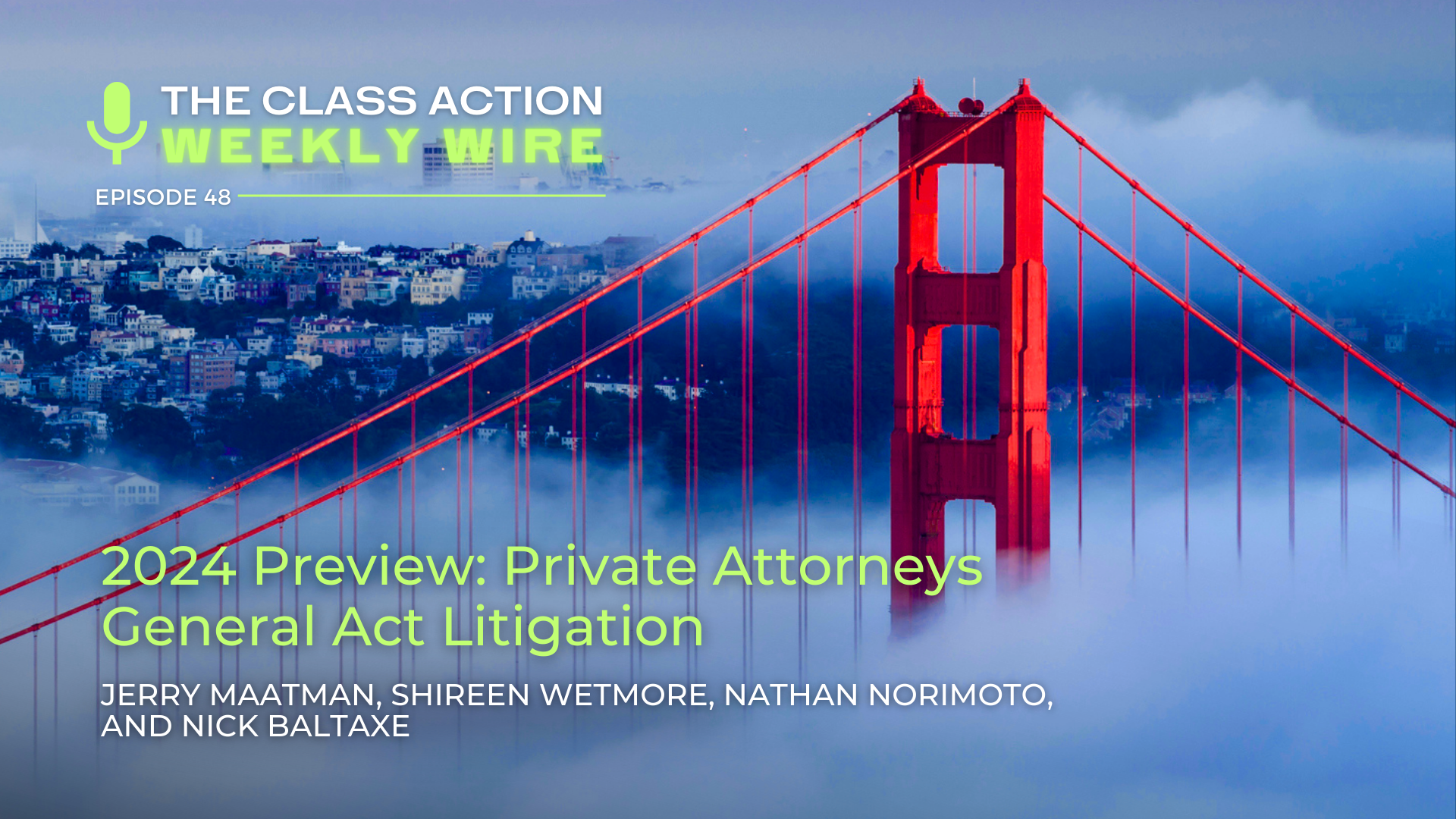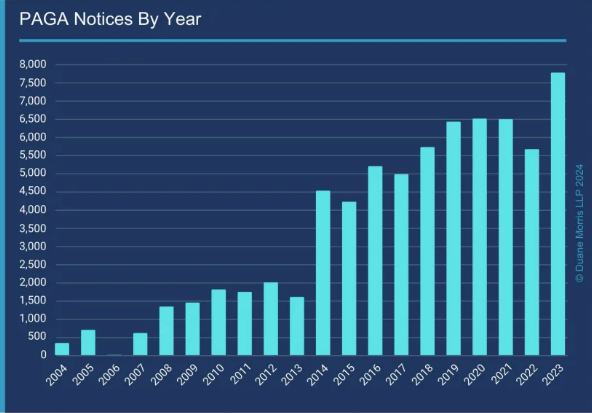
Duane Morris Takeaway: This week’s episode of the Class Action Weekly Wire features Duane Morris partner Jerry Maatman and Shireen Wetmore and associates Nathan Norimoto and Nick Baltaxe with their discussion of 2023 developments and trends in PAGA litigation as detailed in the recently published Duane Morris PAGA Review – 2024.
Check out today’s episode and subscribe to our show from your preferred podcast platform: Spotify, Amazon Music, Apple Podcasts, Google Podcasts, the Samsung Podcasts app, Podcast Index, Tune In, Listen Notes, iHeartRadio, Deezer, YouTube or our RSS feed.
Episode Transcript
Jerry Maatman: Welcome listeners. Thank you for being here for our weekly podcast, the Class Action Weekly Wire. I’m Jerry Maatman, partner at Duane Morris, and joining me today are my three most favorite California colleagues, Shireen, Nick, and Nathan. Thank you so much for being on our podcast.
Shireen Wetmore: Thanks, Jerry. Happy to be part of the podcast.
Nathan Norimoto: Thanks, Jerry, glad to be here.
Nick Baltaxe: Thank you, Jerry. It’s always a pleasure.
Jerry: Today on the podcast we’re discussing this year’s edition of the Duane Morris PAGA Review. This is a unique publication offered in the e-book format from our Duane Morris Class Action Defense Blog. Shireen, can you tell our loyal readers a bit about this year’s book?
Shireen: Absolutely, Jerry. So for many years, actions under the California Private Attorneys General Act, or PAGA, were used by plaintiffs or the plaintiffs’ bar as a workaround to arbitration agreements between employers and employees. In 2022, this strategy had its first big step back following a key decision by the United States Supreme Court in Viking River Cruises. Then, just last year another big decision came down in the California Supreme Court in Adolph v. Uber, adding to the mix and swinging a smidge in the other direction. To assist with understanding what this means for employers facing PAGA claims, Duane Morris has released the Duane Morris Private Attorneys General Act Review, and 2024 is the latest edition of this annual publication. It analyzes key PAGA rulings and litigation developments in 2023, and the significant trends that are apt to impact these types of representative actions in 2024. We hope that companies and employers will benefit from this resource, and that will aid them in their compliance with these evolving laws and standards.
Jerry: After practicing law for four decades, I’ve always thought that PAGA representative actions are some of the most vexing and challenging and difficult cases to defend. Nathan, what are some of the key takeaways for employers in terms of developments over the past 12 months?
Nathan: Well, according to data maintained by the California Department of Industrial Relations, the number of PAGA notices filed with the California Labor and Workforce Development Agency, or the LWDA, has increased exponentially over the past two decades. At the same time, the plaintiffs’ bar in California has used PAGA actions to circumvent workplace arbitration agreements that include class action waivers on the grounds that PAGA claims were somehow different than class actions, and therefore not covered by arbitration defenses. But this PAGA workaround has suffered significant setbacks in 2022 and 2023.
Jerry: If one keeps a litigation scorecard, it kind of changes by the inning – it’s an area that’s very much in flux. Nick, what are some of the setbacks that employers experienced over the past year in terms of defense of PAGA representative actions?
Nick: Well, Jerry, in July of 2023, the California Supreme Court issued its ruling in Adolph v. Uber. The court held that the PAGA plaintiff’s individual claims could be compelled to arbitration, but that the class claims or the representative claims could not be. The court also ruled that the plaintiff retains standing to maintain that representative PAGA claim so long as they’re an aggrieved employee. The court said that if the plaintiff loses an arbitration, they are not an aggrieved employee, and therefore lack standing. However, if the plaintiff prevails or settles their individual claims in arbitration, they could then return to court to prosecute their non-individual representative PAGA claims.
Jerry: Our Duane Morris Class Action Review in 2024 examined 1,300 rulings. By my way of thinking, I think that this particular ruling by the California Supreme Court may be the most important of all of those rulings. Shireen and Nick, I’d be interested in your takeaways of what this means for employers going forward.
Shireen: That’s a great question, Jerry, I think, in the wake of Adolph, the stakes for employers in individual PAGA arbitrations are really high. Employers facing PAGA claims should conduct an early assessment of the plaintiff’s individual claims, and if they are not meritorious, aggressively defend the matter, because a win in arbitration will completely extinguish the court case as well. We’re already seeing PAGA plaintiffs attempt to avoid arbitration through increasingly tenuous theories, or attempt to circumvent these agreements altogether through really creative pleading. It remains to be seen if these pleading strategies will be condoned by the California courts, but it’s a big, big issue for employers.
Nick: Another significant issue for employers is the recent Estrada decision, which struck a blow to employers facing PAGA claims by removing a defense that we were seeing become a little bit more common – the lack of manageability. The California Supreme Court encouraged PAGA plaintiffs to be prudent on their approach to their PAGA theories. However, usually that prudence is not seen in practice. While the decision did effectively remove the lack of manageability as a ground for dismissal, the decision did leave open an employer’s ability to seek dismissal on other due process grounds.
Jerry: I think the watch words are that in 2024, it’s probably even more difficult for employers to defend PAGA actions than it was last year. Nathan, do you have any inside baseball tips for employers in terms of this most recent California Supreme Court ruling, and what it may mean?
Nathan: Definitely, I agree. I think this is a game changer for employers operating in California. The Estrada court held in a unanimous decision that trial courts lack inherent authority to dismiss plans under PAGA with prejudice, to do the lack of manageability. The court, however, declined to address whether and under what circumstances, a defendant’s right to due process might ever support striking a pocket claim. As such. This decision in Estrada is really important for employers and their decision makers in California to read as we move forward in 2024.
Shireen: I would definitely agree with that. I think we’re seeing more and more pile-on PAGA matters where employers are facing either copycat or serial PAGA claims, and without any real adjudication of the claims that are identified in the PAGA letter, especially in the case of these kitchen sink or boilerplate letters. So query whether employers are actually getting a meaningful opportunity to cure these violations as contemplated by the statute. In no other agency context that I can think of would a government agency separately investigate a single employer for the exact same alleged violation in multiple, competing investigations or audits. These issues raise important due process concerns that the Estrada decision teed up very nicely for employers. And this could have a huge impact on the evolving landscape of PAGA, and it might actually mean that the Estrada decision is, in a funny way, a win for employers. So, very excited to see where the litigation goes from here, and especially in 2024.
Jerry: Well, this is truly an area that on our blog will be tracking on a day by day and week by week basis in terms of new developments under California law and PAGA litigation. Thank you so much. Nick, Nathan, and Shireen for sharing your thought leadership today on our podcast.
Nathan: Thank you, Jerry, love being on the podcast.
Nick: Thanks for having me, Jerry, and thank you listeners as well.
Shireen: Thanks, everybody.

